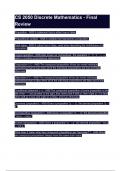-
1. Exam (elaborations) - Cse 2050 - priority q + heap questions with 100% actual correct answers | verified | ...
-
2. Exam (elaborations) - Cse 2050 ch 19 - priority queues questions with 100% actual correct answers | verifi...
-
3. Exam (elaborations) - Cse 2050 ch 17 - balanced binary search trees questions with 100% actual correct ans...
-
4. Exam (elaborations) - Cse 2050 questions with 100% actual correct answers | verified | latest update | grad...
-
5. Exam (elaborations) - Cse 2050 conceptual questions with 100% actual correct answers | verified | latest u...
-
6. Exam (elaborations) - Cse 2050 definitions questions with 100% actual correct answers | verified | latest ...
-
7. Exam (elaborations) - Cse 2050 exam 1 questions with 100% actual correct answers | verified | latest update...
-
8. Exam (elaborations) - Cse 2050 exam 1 mutability questions with 100% actual correct answers | verified | la...
-
9. Exam (elaborations) - Cse 2050 collections ( questions with 100% actual correct answers | verified | latest...
-
10. Exam (elaborations) - Cse 2050 exam 2 questions with 100% actual correct answers | verified | latest update...
-
11. Exam (elaborations) - Cse 2050 exam 2 vocab questions with 100% actual correct answers | verified | latest...
-
12. Exam (elaborations) - Cse 2050 exam 6 questions with 100% actual correct answers | verified | latest update...
-
13. Exam (elaborations) - Cse 2050 exam 2 electric boogaloo questions with 100% actual correct answers | verif...
-
14. Exam (elaborations) - Cse 2050 exam 3 questions with 100% actual correct answers | verified | latest update...
-
15. Exam (elaborations) - Cs 2050 slides summary questions with 100% actual correct answers | verified | lates...
-
16. Exam (elaborations) - Cse 2050 mod 9-12 questions with 100% actual correct answers | verified | latest upd...
-
17. Exam (elaborations) - Cse 2050 in place, stable, adaptive questions with 100% actual correct answers | veri...
-
18. Exam (elaborations) - Cse 2050 midterm vocam questions with 100% actual correct answers | verified | latest...
-
19. Exam (elaborations) - Cse 2050 mod 2 terms questions with 100% actual correct answers | verified | latest u...
-
20. Exam (elaborations) - Cse 2050 mod 5 quiz review questions with 100% actual correct answers | verified | l...
-
21. Exam (elaborations) - Cse 2050 midterm questions with 100% actual correct answers | verified | latest updat...
-
22. Exam (elaborations) - Cse 2050 final questions with 100% actual correct answers | verified | latest update ...
-
23. Exam (elaborations) - Cse 2050 exam 2 questions with 100% actual correct answers | verified | latest update...
-
24. Exam (elaborations) - Cse 2050 module 12 - graphs questions with 100% actual correct answers | verified | ...
-
25. Exam (elaborations) - Cse 2050 mod 7 quiz review questions with 100% actual correct answers | verified | l...
-
26. Exam (elaborations) - Cse 2050 stack queue deque questions with 100% actual correct answers | verified | la...
-
27. Exam (elaborations) - Cse 2050_ week 2 questions with 100% actual correct answers | verified | latest updat...
-
28. Exam (elaborations) - Cse 2050 sorting algorithms questions with 100% actual correct answers | verified | ...
-
29. Exam (elaborations) - Cse 2050 exam 2 - recursion, sorting, and hashing questions with 100% actual correct ...
-
30. Exam (elaborations) - Cse 2050 mod 6 ,7, and 8 terms questions with 100% actual correct answers | verified ...
-
31. Exam (elaborations) - Cse 2050 exam 2 questions with 100% actual correct answers | verified | latest update...
-
32. Exam (elaborations) - Cse 2050 vocab questions with 100% actual correct answers | verified | latest update ...
-
33. Exam (elaborations) - Cse 2050 time complexities questions with 100% actual correct answers | verified | l...
-
34. Exam (elaborations) - Cs 2050 notes questions with 100% actual correct answers | verified | latest update |...
-
35. Exam (elaborations) - Cs 2050 discrete mathematics - final review questions with 100% actual correct answe...
-
36. Exam (elaborations) - Cse205- quiz #2 inheritance & software questions with 100% actual correct answers | v...
-
37. Exam (elaborations) - Cse 2050_ exam 2 questions with 100% actual correct answers | verified | latest upda...
-
38. Exam (elaborations) - Cs 2050_ propositions questions with 100% actual correct answers | verified | latest ...
-
39. Exam (elaborations) - Cs 2050 symbols questions with 100% actual correct answers | verified | latest updat...
-
40. Exam (elaborations) - Csd 5850 midterm study guide question content area top part 1 use the graph of yequal...
-
41. Exam (elaborations) - Cse 2050 final exam questions with 100% actual correct answers | verified | latest u...
-
42. Exam (elaborations) - Cse 2050_ week 1 questions with 100% actual correct answers | verified | latest updat...
-
43. Exam (elaborations) - Cse exam questions with 100% actual correct answers | verified | latest update | grad...
-
Show more




